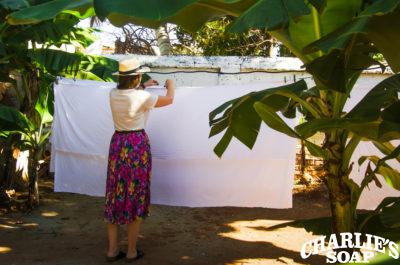
How to Wash Organic Cotton Sheets and Linens

How to Wash Organic Cotton Sheets
You went out and splurged on organic, natural linens. You’re worth it. Right? But now you’re wondering, “Uh-oh. Are there special directions on how to wash organic cotton sheets?”
And the answer is – sort of! While you don’t have to handwash organic cotton linens, you definitely will want to keep them in pristine condition. The chemicals, abrasives, and fragrances in regular laundry soap might compromise the fabric, so instead, use an all-natural soap to clean and care for those linens.
The Difference Between Organic and Non-Organic Cotton
A big question most people have is “what’s the difference between organic and non-organic cotton linens?” Essentially, organic cotton is grown without synthetic fertilizers, pesticides, or defoliants. Instead, organic cotton is produced using a method of utilizing natural elements and seasons through a process of crop rotation, hand weeding, and love.
For a cotton field to be considered organic, it must maintain an environment free of synthetic pesticides and fertilizers for at least three years.
Why does this matter when it comes to sheets? Well, when synthetic additives are incorporated into the soil, they are absorbed by the plants and therefore absorbed into the final product – i.e., the cotton. When the cotton is spun into linens and sheets, you are then sleeping with trace amounts of these chemicals that may stay with the sheets for the entirety of their use.
How to Wash Organic Cotton Sheets
Most manufacturers recommend washing your organic cotton sheets in cold water, on a gentle or delicate cycle with like colors. Cold water is important because it helps to keep shrinking at a minimum – however, if you need to sanitize the sheets, you can use hot water once in a while or add a natural disinfectant, like vinegar, to your cycle.
Next, it’s essential to use a natural, plant-based laundry detergent. This ensures that your sheets (and your washing machine) will wash completely clean – leaving behind no pesky residues that may make your skin itchy or irritated.
Forget all about those fabric softeners and anti-static dryer sheets. Coating fine organic linens’ fibers with a softener will ruin the finish and soon the fabric itself. If you find the sheets a little rough after washing, consider rinsing with white vinegar. It won’t get into the cells of the fabric and do damage.
Next – you’ll want to line dry your organic fabrics. Inside or outside is fine, but ideally you’ll want to hang natural linens somewhere away from direct sunlight. This is because bright lights and UV rays can fade colors or cause whites to look yellow. If hang drying is not an option (as most of us have other things to get done during the day), gently tumble dry on the machine’s lowest setting. Be very careful here: organic fabrics’ fibers will break down if put under too much heat for too long or too many rotations. It’s best to take out of the dryer still slightly damp.
Finally, if you like that crisp look of hotel sheets, a warm iron can help smooth out any wrinkles and creases.
Charlie’s Soap to the Rescue
We know that laundry can take up a lot of your time, especially if you have a big family. But we promise that all of this work is totally worth it. In fact, did you know that organic linens naturally get softer over time with each wash? And who doesn’t want softer sheets?
Save those fantastic organic linens by using Charlie’s Soap for every wash. It’s safe for anything that is machine washable because our detergents are specifically designed to not adhere to fabric or damage it in any way. To test our soaps, we once soaked a 100% linen shirt in pure Charlie’s Soap Laundry Liquid for a week. The result? It was clean and soft.
So take the next step and protect your investment in good sleeping with laundry powder, liquid, and pre-sprays from Charlie’s Soap!

Leave a Reply